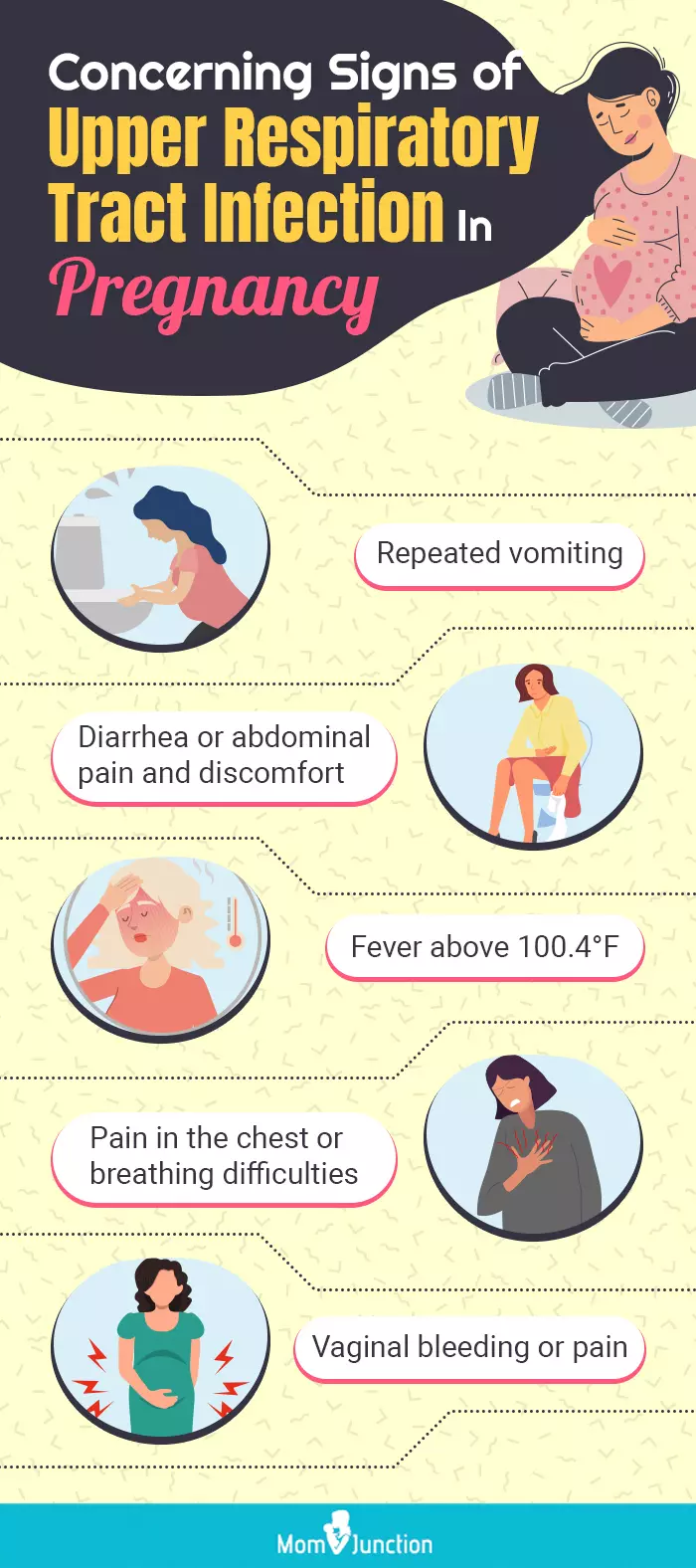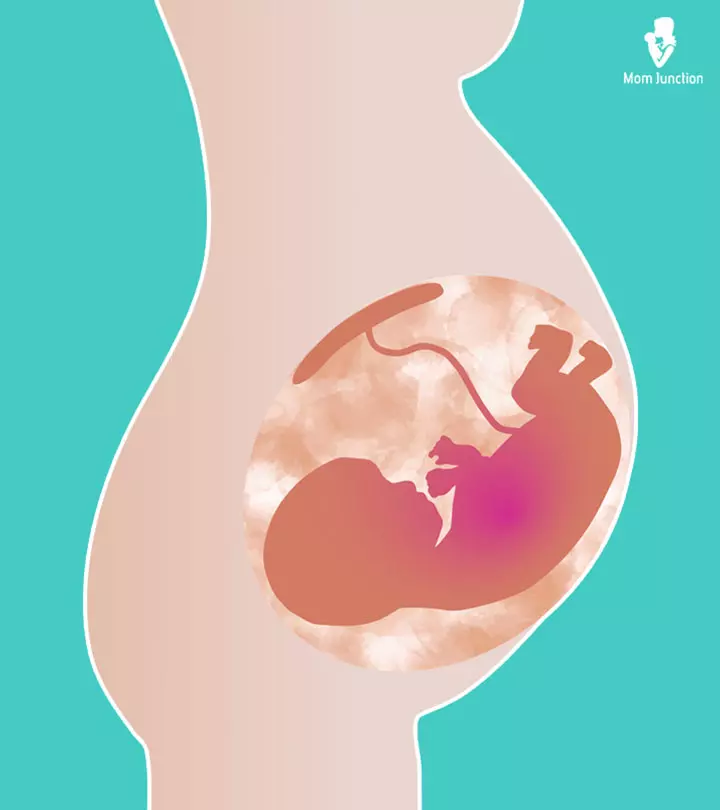
Image: Shutterstock
Pregnancy brings about a lot of changes that you may be unaware of earlier.
While managing all minor discomforts and transitions, an upper respiratory tract infection during pregnancy is not easy to cope with. A cold is the result of a viral infection in the upper respiratory tract. Most people find it annoying to deal with a cold in a normal state; it is more difficult to cope with it while pregnant. Moreover, most viral infections do not usually respond to antibiotic medications; hence they take their course to come down eventually. Keep reading to know more about the types, signs, and prevention of upper respiratory tract infections when pregnant.
Key Pointers
- Influenza, chickenpox, fifth disease, cytomegalovirus, and rubella can affect the upper respiratory tract.
- The common cold and flu (influenza) are the most common causes of upper respiratory tract infections in pregnancy.
- Management of upper respiratory tract infection during pregnancy includes keeping fever under control, using a humidifier, trying natural remedies like basil and honey, and ensuring adequate hydration and rest.
- Immediate medical attention is essential for symptoms such as shortness of breath, chest pain, a fever above 100.4°F, or persistent diarrhea or vomiting.
- Prevention measures for upper respiratory tract infections include frequent hand washing, maintaining clean surroundings, avoiding crowded places and exposure to dust and pollen, and using sanitizer while traveling.
Kinds Of Upper Respiratory Tract Infections
The common cold is not the only infection that can affect your upper respiratory tract . Some other viral upper airway infections include:
- Influenza
- Chickenpox (varicella)
- Fifth diseasei Viral disease caused by parvovirus B19 characterized by rashes on the arms, cheeks, and legs.
- CytomegalovirusiA virus present in an inactive state in humans, capable of causing contagious infections in people with weak immunity.
- Rubella
- Sinusitis
- Epiglottitis
- Pharyngitis
- Laryngitis
Fortunately, most women do not have to deal with many of these illnesses during pregnancy. A cold or flu is the most common maternal respiratory infection encountered during pregnancy.
Most people often think that cold and flu are the same. But that is not true. Though both are upper respiratory tract infections and resemble each other, they have some subtle differences.
Signs And Symptoms Of Cold
An acute inflammation of the upper respiratory tract can cause a common cold
. The symptoms of a cold may include:
- Headache
- Loss of smell
- Body aches
- Cough
- Runny nose

Image: IStock
- Nasal congestion
Signs And Symptoms Of Influenza
Influenza or the flu is also a viral infection that affects the upper respiratory tract
. It is usually a common complaint during the winter months.
The symptoms of flu can set in suddenly and include:
- Chills
- Fever
- Headache
- Body ache
- Weakness
- Sweating
- Runny nose
- Coughing

Image: IStock
- Sore throat
- Sneezing
- Nasal discharge or Runny nose
- Coughing
 Quick fact
Quick factTreating Common Upper Respiratory Tract Infection During Pregnancy
When you are pregnant, even simple illnesses may last longer or have a more serious effect than usual, because of your weakened immune system.
In any case, your best bet during a cold or flu is to find as much comfort as you can.
Some things you can do to manage your cold or flu symptoms include:
1. Rest
An upper respiratory tract infection can leave you weak. So, rest as much as you possibly can.
2. Keep Yourself Hydrated
It is very easy to become dehydrated when you are down with a cold. So keep taking fluids. Remember, dehydration can slow down the baby’s growth and lead to premature labor and birth!
3. Keep Fever Under Control

Image: Shutterstock
If you develop a fever, try to keep it below 100.4° F. High fever during pregnancy can cause several birth defects in your unborn baby like neural tube defectsiCongenital abnormalities in the brain, spine, or spinal cord that usually happen during the early weeks of pregnancy. , microphthalmiaiA condition where babies are born with abnormally developed (or small) eyes. , cataractiA condition that causes the eye's lens to become cloudy. , microcephalyiA rare condition where the baby's head size is less than average at birth. , functional and behavioral problems (1).
Some steps you can take to manage your fever include:
- Wearing loose clothes to allow body heat to escape.
- You should also try taking a bath with lukewarm water.
- You can use medications to reduce fever after consulting your doctor.
4. Say Goodbye To Congestion
Congestion can cause acute distress during a cold. To find relief from nasal congestion, try some extra humidity. Use a humidifier in your room. You can also use a neti pot or saline water for some relief.
5. Cough No More
A persistent cough in pregnancy can cause discomfort to pregnant women. So, try using home remedies like basil leaf, ginger, honey, etc. for relief. Consult your doctor before using cough or flu medicine, as some over-the-counter drugs may not be safe for use during pregnancy.
 Quick fact
Quick factWhen To Seek Medical Help?
Most cold and flu cases are time-bound and pass without many issues. But in some cases, it may be important to call your doctor. See your doctor if:
- You develop abdominal cramps that refuse to go away.
- You develop diarrhea and vomiting.
- You experience vaginal bleeding
- Your fever shoots up above 100.4°F.
- You develop chest pain and shortness of breath.

Image: IStock
- Wheezing
- Your symptoms persist beyond a week.
Preventing Upper Respiratory Tract Infection In Pregnancy
The H1N1 virus mimics the common cold and flu virus but can prove to be fatal for pregnant women(2)
. That is why it is important to keep an eye on your upper respiratory tract infections.
Severe cases of upper respiratory tract infections can cause premature birth, lower birth weights, cesarean delivery, etc (3).
If you want to avoid these complications, you can opt for the flu vaccine. You can also try the H1N1 vaccine that provides your body with immunity against Swine flu. Many pregnant women are wary of trying these vaccines for fear of harming their babies. Don’t worry! Studies show that flu vaccines, including the H1N1 vaccine, do not cause adverse pregnancy fallouts (4). A CDC report published in 2020 revealed that approximately 60% of pregnant women in the United States received the influenza vaccine during the season before the study.
Some other methods you can use to prevent upper respiratory tract infections can comprise the following (5):
- Washing your hands often.
- Avoiding crowded places.
- Keeping your home clean and dust-free.
- Avoiding exposure to smoke and pollen.
- If you are traveling, carry a hand sanitizer.

Image: Shutterstock
- Do not rub your eyes as that can transmit virus to your nasal cavity through the tear ducts.
Frequently Asked Questions
1. What vitamins are good for upper respiratory tract infection?
Studies have shown that vitamins C and D supplementation could help reduce the risk of upper respiratory tract infections. Moreover, vitamin C and zinc might aid in alleviating the symptoms of acute respiratory tract infections (ARIs) (6).
2. What can a pregnant woman take for an upper respiratory tract infection?
Most pregnant women do not acquire serious respiratory tract infections. But if they do, seek medical advice on the right interventions to avoid complications. According to a few studies, erythromycin monotherapy is the initial line of treatment and is considered safe in women with moderate to severe prenatal respiratory infections, such as pneumonia (7).
3. How can pregnant women boost their immune system to prevent upper respiratory tract infections?
During pregnancy, the immune system changes to protect the baby, making you more prone to respiratory infections. Pregnant women may boost their immune system to prevent upper respiratory tract infections by maintaining a balanced diet rich in vitamins and minerals, taking the prescribed prenatal vitamins, staying physically active within their healthcare provider’s guidelines, and practicing good hygiene, such as regular handwashing and avoiding close contact with sick individuals. Getting adequate rest and managing stress can also support a healthy immune system during pregnancy.
4. How can pregnant women manage their symptoms and continue their daily routines while dealing with an upper respiratory tract infection?
Pregnant women dealing with an upper respiratory tract infection may manage their symptoms and continue their daily routines by getting plenty of rest, staying hydrated, and taking over-the-counter medications approved by their healthcare provider for symptom relief. It is essential to consult with a healthcare professional for personalized advice and guidance tailored to the specific needs and circumstances of the pregnancy.
5. Are there any natural remedies for an upper respiratory tract infection during pregnancy?
While it is always vital for pregnant women to consult with their healthcare provider before using any natural remedies, some options may help alleviate symptoms of an upper respiratory tract infection. These can include drinking warm fluids like herbal teas or honey-infused warm water for soothing the throat, using saline nasal rinses or sprays for congestion relief, inhaling steam from a warm shower or bowl of hot water to help with congestion, and using a humidifier to add moisture to the air and ease breathing. However, discussing these remedies with a healthcare professional is crucial to ensure they are safe and appropriate for your specific situation.
6. What are the long-term effects of an upper respiratory tract infection during pregnancy?
There could be serious long-term effects of upper respiratory tract infection. Pregnant women diagnosed with pneumonia are at increased risk of experiencing medical complications, including conditions like meningitis, pericarditis, empyema, and endocarditis and pregnancy complications such as fetal distress, low birth weight, and preterm birth. URTI showed a positive correlation with preterm delivery and cesarean delivery. It is important to note that further research is needed to fully understand the relationship between URTI and adverse perinatal outcomes (9).
A cold or flu is the most common upper respiratory tract infection during pregnancy. Rubella, chickenpox, and cytomegalovirus also can affect the upper respiratory tract. However, the availability of vaccines and preventive measures reduces the risk of these infections in pregnant women. Headaches, runny or stuffy nose, cough, mild fever, and body pain are common symptoms of respiratory infections. Adequate rest, hydration, and fever medications can manage these infections. Getting flu vaccination, maintaining hand and respiratory hygiene, and avoiding close contact with sick people may prevent the spread.
Infographic: Visit Your OB-GYN If You Notice These Symptoms
Respiratory illnesses such as the common cold are generally self-resolving when mild; however, if the symptoms of these infections last for a while during pregnancy, it warrants prompt medical attention. This infographic explains when to see a doctor for upper respiratory tract infections during pregnancy. Illustration: Momjunction Design Team
Illustration: How To Manage Upper Respiratory Infection During Pregnancy?

Image: Stable Diffusion/MomJunction Design Team
References
- Marshall J Edwards; (2006); Review: Hyperthermia and fever during pregnancy.
https://pubmed.ncbi.nlm.nih.gov/16933304/ - H1N1 Flu.
https://archive.cdc.gov/#/details?url=https://www.cdc.gov/h1n1flu/in_the_news/pregnancy_qa.htm - Julia Harris and Eyal Sheiner; (2013); Does an upper respiratory tract infection during pregnancy affect perinatal outcomes? A literature review.
https://pubmed.ncbi.nlm.nih.gov/23361838/ - Björn Pasternak et al.; (2012); Vaccination against pandemic A/H1N1 2009 influenza in pregnancy and risk of fetal death: cohort study in Denmark.
https://pubmed.ncbi.nlm.nih.gov/22551713/ - Chronic Obstructive Pulmonary Disease (COPD)
https://my.clevelandclinic.org/health/diseases/8709-chronic-obstructive-pulmonary-disease-copd - Ajibola Ibraheem Abioye et al., (2021); Effect of micronutrient supplements on influenza and other respiratory tract infections among adults: a systematic review and meta-analysis.
https://www.ncbi.nlm.nih.gov/pmc/articles/PMC7818810/ - Vanessa Laibl and Jeanne Sheffield; (2006); The Management of Respiratory Infections During Pregnancy.
https://www.ncbi.nlm.nih.gov/pmc/articles/PMC7118874/ - Influenza (Flu) Vaccine and Pregnancy.
https://www.cdc.gov/vaccines-pregnancy/moms-to-be/index.html
Community Experiences
Join the conversation and become a part of our nurturing community! Share your stories, experiences, and insights to connect with fellow parents.
Read full bio of Dr. Neha Singh
Read full bio of shreeja pillai
Read full bio of Rebecca Malachi
Read full bio of Dr. Joyani Das



















